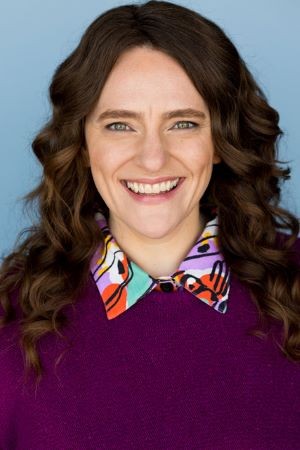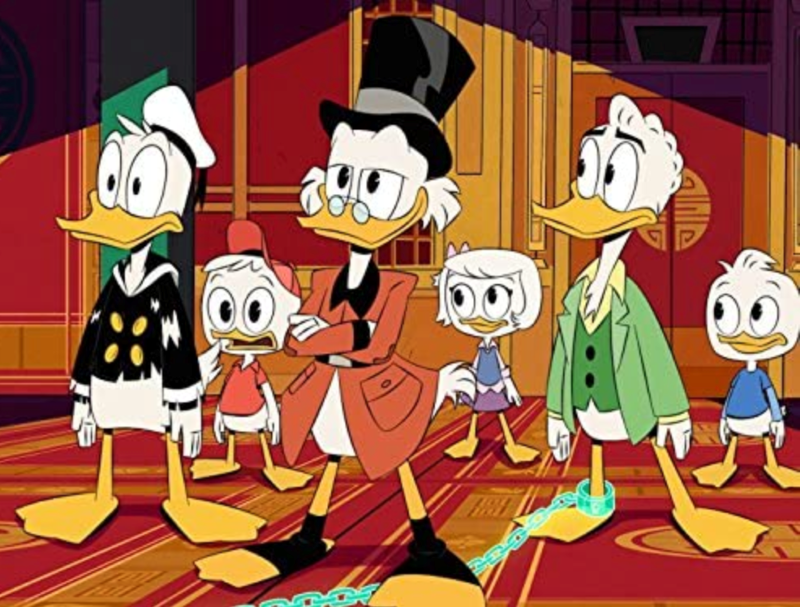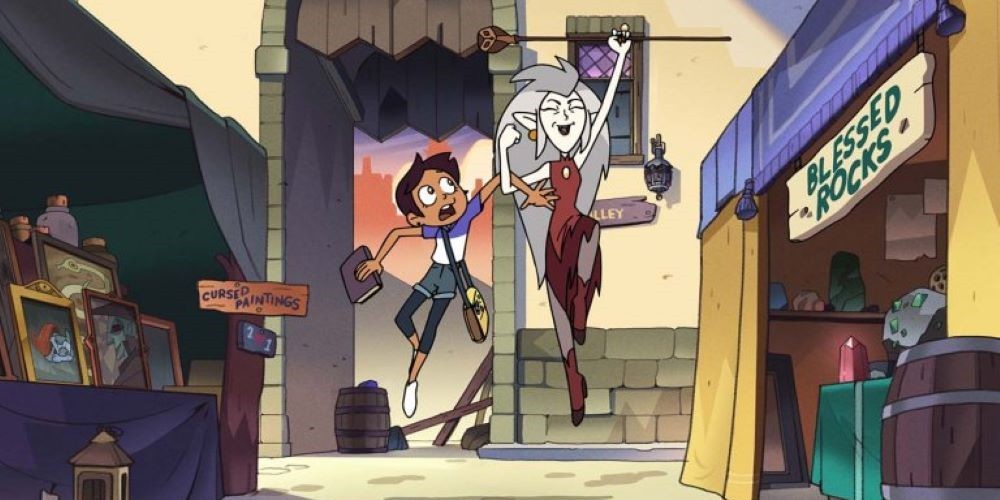Animation Conversations: Alumna Rachel Vine '06
Animation Conversations is an interview series with Film faculty, students, and alumni where we discuss working as screenwriters, directors, and producers in the animation industry.
We recently sat down with alumna and screenwriter extraordinaire Rachel Vine ’06 to talk about everything from her Peabody-winning series The Owl House to her time spent writing for DuckTales alongside some fellow Columbia alumni.
Rachel Vine is a writer with experience across live-action, animation, and features. She is currently developing a YA single-camera comedy at HBOMax. Previously, she was at Disney TV Animation under an overall deal and served as Head Writer of the Peabody Award-Winning series The Owl House. She got her start teaching screenwriting at the MFA level and has developed a number of feature films. She is a mother of two and likes to nerd out about California native plants and Jungian takes on mythology.

You have written for so many animated series! How did you get your start in the world of animation?
Rachel Vine [RV]: When I was at Columbia, I focused on screenwriting, particularly feature films. I had been working to get some features going, and it was tough—something would get optioned, but not really go. So I decided I would try TV. At that point, I didn’t have any experience with TV. I had maybe taken one class at Columbia that focused on television writing. Columbia was much more focused on feature films at that time. I felt good about making the transition from features to TV. I saw how many more jobs there were in television for writers than there were in features. It was also around the same time that I was about to have my first child.
I came up with this master plan that I would have the baby and use my maternity leave to write a TV spec [script]—it’s not like you’re doing anything else during maternity leave, right? Like caring for a brand new creature you just expelled from your body [laughs]; But when I got home from the hospital, we received a call from a friend who worked at Hallmark. He told me that they were taking open pitches for a Rainbow Brite reboot and asked if we had any interest. My husband, who also is a writer, was on contract, but I was available. I adored Rainbow Brite as a kid. I still had all my dolls and color cottage—all of these things in my closet. So I decided to do it.
That’s so amazing! What was that like?
RV: I drove across LA in rush hour with my two-week-old baby and my aunt. She sat in the car with my baby. I went up and pitched. And I got it. The great thing about it was because Hallmark was developing the show for their in-house streaming service, everything happened in-house. I wrote three 11-minute episodes, they were all produced and animated there, and the episodes launched nine months later, which, in animation, is a huge turnaround. It had buzz around it as a project because it was a reboot—it was a show people had nostalgia for. It starred Emily Osment [Hannah Montana, Young & Hungry] and Molly Ringwald [Sixteen Candles, The Breakfast Club], and received some good publicity. It was a lot of fun and I really enjoyed it. I found the actual, structural writing components of working on it were so similar to features that it was an easy transition to make.
Once the show aired, suddenly, jobs started coming to me. Now I had produced work and had the experience of writing three scripts. From that point, I started freelancing and hopping from studio to studio, which included Disney, Nickelodeon, and Warner Brothers. I did that for the next three years or so.
What is it like freelancing as a writer in animation?
RV: Some shows have writers' rooms. Others don’t. Some shows only staff a story editor and then hire freelance writers to pen the scripts—a story editor in animation is the live-action equivalent of a showrunner or head writer. Even the shows that do have writers' rooms, sometimes they get overwhelmed and there’s value in hiring a freelance writer who can pop in, get the voices of the characters, break the story, and write the script. Freelancing was something that came easily to me because I had gone through Columbia, and even before Columbia, I received a BFA in dramatic writing from NYU. I had been writing for years, and I could come in, figure out the story, get the story together, and write the script. It worked well.
Does your approach to writing differ at all when writing animation?
RV: With the medium of screenwriting, as opposed to writing prose, you're writing something you're hoping will get made. Maybe it's something you're going to produce yourself. Maybe it's something you will pitch to a company. When you're writing the script, you're thinking about that part of it too. In animation, it's sort of the same way. Something I'm always cognizant of when I'm writing for animation is that this is all being created by people—people who are creating frame by frame what it is I'm writing, who are doing that heavy lifting. For example, crowd scenes are hard in animation because you then have to be animating every single face on every single person in that crowd. Things like that. I take the same approach I would in features, always considering what the production demands will be.
You worked on the critically acclaimed series, The Owl House. How did you become involved with the show?
RV: [The Owl House] was such a joy to be a part of. I met the creator, Dana Terrace, at Comic-Con. She had directed an episode of DuckTales that I had freelanced for, and I really loved how that episode had come out. When I met her, I told her how I loved what she had done with that script. And she was like, I love that script—I have a show in development right now at Disney and I'm looking for a story editor, can we talk? So we talked. I submitted a packet to her and she gave me the rundown of what she had. She had this world and the entry point for the audience, but it still needed to be fleshed out. We worked together, and it was incredible. We had really similar sensibilities and points of view in terms of who the characters were and how to build out the bigger world.
It was really exciting to be there for the green light. We went from this scrappy development team to, all of a sudden, this big, beautiful crew. The talent on The Owl House is just beyond. I never take my time on that show for granted. It was such a magical thing to be a part of. Everybody worked really, really hard, and it shows on the screen. It was really validating when the show won the Peabody award. It felt really good that all of the work we were putting in was resonating.
What was it like serving as the story editor for the show?
RV: Before The Owl House, I'd been freelancing, going from show to show and never really meeting anyone beyond the executive producers and the people in the writers' room. Coming in as story editor for The Owl House became a crash course in animation production 101 for me. I would sit in on storyboard reviews and edits. I was there for voice recording sessions. It really prepared me for where I'm at now. It gave me not only an understanding of the process, but also a much greater respect for it because I know how much time and energy is put into every step along the way.
What was it like running the writers' room?
RV: It's magic. It’s important that your room clicks. It means making sure you're bringing in people who can all bring a little something different. When you're staffing a writers’ room, you're thinking of a few things, including diversity of life experience. Because so much of what you're tapping into as a writer is going to come from what you've lived and what you've seen and what you know. One of the joys of having a writers’ room is that you have this collective experience that can really help to build something bigger than any one person could do on their own.
On The Owl House specifically, we all had such wildly different experiences and there was just this incredible synergy. What I was really grateful for is that they all really understood the characters and the world, which made my job as story editor—who has to go through and make all the tweaks and fine cuts—a lot easier. It was also the first writers' room I ever ran, so it's a room that I'll always hold so dear to my heart.
What would a typical day as story editor look like for you?
RV: It depends where we were in the process, but there's a lot of time spent in the writers' room, breaking episodes, doing punch-ups, sending writers off to script. Things like that. I would also meet with writers to give feedback on scripts. We were in-house for Disney, so there were also additional note sessions and check-ins. I might attend voice recording sessions, which is always so much fun.
It sounds like there are a lot of moving parts to manage.
RV: You know, when I was at Columbia, I also focused on producing. When I first came out of school, I was working in the film industry on sets and writing my own stuff at night. Working in production, you have to learn how to navigate a lot of different personalities and, ultimately, get them to do what you need in a way that is respectful to them, you, and the creative project you're both working on. This is why I loved the film program so much at Columbia, because you really get a sense of every aspect of the process—writing, producing, directing, and what all of that incorporates. Having that well-rounded understanding of the process really, really helped me as head writer on a show.
You also spent some time working on DuckTales with some fellow Columbia alumni. How did you get involved with that?
RV: My husband, Frank [fellow alumnus Francisco Angones '11] got into animation a little bit before I did, but we got to it in different ways. On DuckTales, they didn't have writer contracts finalized yet, but their production schedule had already started and they needed a script. It was easy for Frank, as the co-creator and writer on the show, to come to me and talk about freelancing a script, because we had already been talking things through about the show, and I'd already been freelancing for years. That's how I wrote the third episode of DuckTales. Then I came in and wrote a second episode for them.
DuckTales was also the sort of room where the writers all really gelled with each other, and there were two other Columbia alumni in the room, Robert Snow '10 and Christian Magalhaes '10, so that was really fun. Having even just four Columbia people who all share that same story language, who come from a similar perspective, was really fun. And I think you really see that in the show at large—the storytelling in those three seasons of DuckTales is so outstanding and so on point and so strong and the emotional arcs of the characters are so strong. There's a real craft in that show. It was such a labor of love.
Do you have any advice you want to share with aspiring screenwriters that are in the trenches of the program?
RV: Oh my gosh [laughs]. I loved my time at Columbia. From undergrad, I went straight to Columbia. Suddenly, I was with 65 people or so who just loved film and came from all corners of the globe. We were all so passionate and I just had a blast. While I was there, I focused on sharpening the pencil for the story that I want to tell, because I knew that would be harder to do once I was out of school. There's also something beautiful about the faculty that Columbia brings in and the relationships you can cultivate with them. For me, they were such a crucial part of me finding my voice and Professor Katherine Dieckmann has always been such a touchstone for me. I've always been grateful for her insight—from the days of screenwriting three and four, to recently when we were emailing about all kinds of different things.
The friends I met at Columbia are still my best friends in my life now. It's so wild. I also had the added event of September 11, which happened that first week of our first year, that I think bonded our class in a really unique way. The friendships that can come out of the program—just seeing where y'all go is really cool to watch. I really loved my time there.
Do you have a favorite work that’s been an important touchstone for you?
RV: I've always loved Jules and Jim by Truffaut. That's always been one of my favorite movies. It’s like a cozy duvet on a winter’s day. Fleabag season two was just a revelation for me, in terms of what it explored and had to say. Every Friday is movie night at my house, and my kids went through this phase for a year and a half where we were always watching My Neighbor Totoro. Three Halloweens ago, we all went as Totoro characters [laughs]. Every time I watch that movie, I find something new and I find something that is just magical. The backgrounds are almost like oil paintings.
I’m also reading voraciously. I gravitate to stories about what society might deem “badly behaved women.” It’s an arena that I have always loved to explore. Almost everything I do is about women who have been pushed to the fringes—who have to make a life out of what has been thrown at them, and who do it with grace and aplomb.

